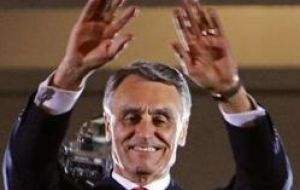MercoPress. South Atlantic News Agency
Exit Polls Show Portuguese Leader Cavaco Silva is Re-elected
 The re-elected President Anibal Cavaco Silva
The re-elected President Anibal Cavaco Silva Portuguese voters Sunday re-elected Anibal Cavaco Silva for a second term in office, showing that they want political stability. However, there are difficult months ahead asd the country has to face up to the European Union crisis.
According to an exit poll from one of Portugal's leading news stations, SIC Noticias, Cavaco Silva from the center-right Social Democrat party won between 51.6% and 56% of the votes, while Manuel Alegre from the Socialist party is in second place with 17.1% to 20.9% of the votes. The remaining votes were divided among the other four candidates.
The turnout was low with an abstention rate of 47% to 51.2%, according to SIC Noticias.
Cavaco Silva, 71, will start his second five-year presidency under great pressure to maintain the political stability that has so far allowed Portugal to approve a harsh austerity plan and avoid a debt crisis. At the same time, he may face increasing pressure from his own party, the Social Democrats, and its leader, Pedro Passos Coelho, to topple the Socialist minority government and pave the way for new elections.
The minority government of Socialist Prime Minister Jose Socrates managed to pass the 2011 budget, which included public-sector wage cuts, reductions in welfare benefits, and tax increases, with the help of the Social Democrats, who abstained from voting after forcing the government to accept more spending cuts than originally planned.
The budget aims to reduce the government's fiscal deficit to 4.6% of gross domestic product in 2011 from an estimated 7.3% of GDP in 2010.
Concern about the country's ability to repay its debt, following the crises that forced the Greek and Irish governments to accept help from the EU and the International Monetary Fund, has pushed the price Portugal has to pay to finance its deficit higher in the past year,. If international financial markets continue to demand higher interest rates from Portugal, the country might also be forced to turn to the EU and the IMF for help, despite Socrates's insistence that that won't be necessary.
The cease-fire between Socrates and the biggest opposition party seems to be unraveling following comments from Passos Coelho that the prime minister and his government will be ousted if the country requires help from the IMF. “If the IMF enters Portugal, the current government will have to step down,” Passos Coelho, 46, recently said on local radio TSF.
As president, Cavaco Silva's role is largely ceremonial since executive power lies with the prime minister. But the president has the right to dissolve parliament, and he can also use his office as a platform to criticize the government. Cavaco Silva has hinted he could do either, or both.
During his campaign, Cavaco Silva broke away from his traditionally conciliatory tone to underscore the fact that Portugal still faces the possibility of a “grave crisis,” both in economic and political terms. He noted that he would be more “demanding” of the current government and would be prepared to act as an instrument of last resort in a crisis situation.
Cavaco Silva later distanced himself from such comments by saying that he had “little appetite” to use the “atomic bomb” of dissolving parliament and would seek stability for the country. But political analysts say the threat is still very real.
The president would only be able to break up parliament from March 9 since he's not allowed to exercise his power before then by law. The process of dismantling and electing a new government could also take several months, meaning any change in government wouldn't happen until the summer at the earliest.
The government will face two trigger points that could spark a general election, according to political analysts and economists: the first-quarter budget results due around April and the debate for next year's budget, due in the summer.
If the government fails to meet its budget-deficit-reduction target for the first quarter, it would lose credibility “and the probability that the government would need to step down would rise,” political analyst Andre Freire at Lisbon University Institute said.
Failure to agree upon a budget for next year could force a vote of no confidence which would cause the current government to topple, Joao Cantiga Esteves, economist at Technical University of Lisbon said. The president wouldn't dissolve parliament in this case, but would rather have to build consensus among the parties to vote for no confidence. Esteves said such consensus building was unlikely to happen.
Regardless of possible scenarios, Cavaco Silva is expected to continue pursuing a conciliatory strategy of political stability and cohesion in his second presidential term. He may intervene more in political affairs since he can't run for another term, Freire said, but he's unlikely to dissolve parliament because it would take several months to elect another government, something which the country can't afford to do if it plans to reduce its budget deficit to 2.8% of GDP in 2012, Esteves said.
He noted that a vote for Cavaco Silva therefore is “primarily a vote for stability.”




Top Comments
Disclaimer & comment rulesCommenting for this story is now closed.
If you have a Facebook account, become a fan and comment on our Facebook Page!